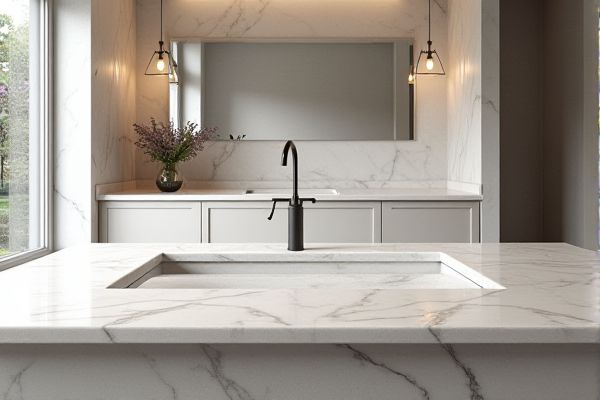
Marble tops offer timeless elegance and natural veining, but they require more maintenance and are prone to scratching and staining, while quartz tops provide superior durability, low maintenance, and a wide range of consistent colors and patterns. Discover which option best suits your style and practical needs by reading the rest of the article.
Table of Comparison
| Feature | Marble Top | Quartz Top |
|---|---|---|
| Material | Natural metamorphic rock | Engineered stone (quartz + resins) |
| Durability | Moderate; prone to scratches and chips | Highly durable; scratch and chip resistant |
| Maintenance | Requires regular sealing; sensitive to acids | Low maintenance; non-porous and stain resistant |
| Appearance | Unique veining, natural patterns | Consistent color and patterns |
| Heat Resistance | Moderate; can stain or burn | Excellent; resists heat well |
| Cost | Higher initial cost | Moderate to high cost |
| Ideal Use | Luxury spaces, low-traffic areas | High-traffic kitchens, bathrooms |
Introduction: Comparing Marble and Quartz Countertops
Marble countertops exhibit natural veining and a unique, elegant appearance that enhances luxury kitchen or bathroom designs. Quartz countertops offer superior durability, non-porous surfaces, and low maintenance, making them ideal for high-traffic areas. Comparing the heat resistance, staining potential, and overall lifespan of marble versus quartz highlights their distinct functional and aesthetic benefits.
Material Composition: Marble vs Quartz
Marble tops are composed primarily of natural calcium carbonate, formed from compressed limestone over millions of years, offering unique veining and a smooth, porous surface. Quartz tops are engineered surfaces made from approximately 90% crushed natural quartz combined with resins and pigments, resulting in a highly durable, non-porous material resistant to stains and scratches. The inherent softness and porosity of marble require regular sealing, while quartz's engineered composition provides consistent color patterns and enhanced strength.
Aesthetic Differences: Visual Appeal and Color Options
Marble tops showcase natural veining and unique patterns that enhance your space with timeless elegance, offering colors like white, gray, and green with intricate swirls. Quartz tops provide a broader palette of consistent colors and patterns, including bold hues and engineered designs that suit modern aesthetics. Your choice depends on whether you prioritize the classic, one-of-a-kind beauty of marble or the versatile, uniform look of quartz.
Durability and Strength: Which Surface Lasts Longer?
Quartz tops offer superior durability and strength compared to marble tops, with engineered quartz resisting scratches, stains, and heat more effectively due to its non-porous composition. Marble, a natural stone, is softer and more prone to etching, chipping, and staining, requiring regular sealing and maintenance to preserve its appearance and longevity. For long-lasting performance in high-traffic or heavy-use areas, quartz surfaces consistently outlast marble by maintaining structural integrity and aesthetic appeal over time.
Maintenance Requirements: Cleaning and Upkeep
Marble tops demand frequent sealing and gentle cleaning with pH-neutral products to prevent staining and etching, while quartz tops offer low maintenance care with non-porous surfaces resistant to stains and scratches, requiring only routine wiping with mild detergent. Your choice between marble and quartz affects daily upkeep time, as marble's porous nature necessitates more cautious handling to maintain its appearance. Choosing quartz reduces cleaning effort and prolongs countertop durability due to its engineered composition and resistance to damage.
Stain and Scratch Resistance: Performance in Daily Use
Quartz tops offer superior stain and scratch resistance compared to marble tops, making them ideal for high-traffic kitchens and daily use scenarios. Marble, being softer and more porous, is prone to etching and staining from acidic substances, requiring more maintenance and protective sealing. If your priority is durability and ease of care, quartz countertops provide a more resilient surface that maintains its appearance over time.
Cost Considerations: Price Comparison
Marble countertops typically range from $40 to $100 per square foot, with high-end options exceeding this, while quartz countertops generally cost between $50 and $150 per square foot. Marble's price varies based on rarity and veining patterns, often leading to higher maintenance expenses, whereas quartz, a man-made material, offers more consistent pricing and lower upkeep costs. Considering installation and long-term durability, quartz may present a more cost-effective choice despite its higher initial price compared to mid-range marble.
Environmental Impact: Sustainability of Marble and Quartz
Marble tops are natural stone products that require quarrying, often causing habitat disruption and high energy use during extraction and transportation. Quartz tops combine natural quartz with resins and pigments, and while engineered quartz reduces waste by using manufacturing byproducts, the resin content involves petrochemical components that impact sustainability. Your choice between marble and quartz top should consider these environmental trade-offs, balancing natural resource use against synthetic material impacts.
Installation Process: What to Expect
Marble tops require careful handling during installation due to their natural veining and susceptibility to chipping, often demanding skilled professionals for precise cutting and sealing. Quartz tops offer a more straightforward installation process because of their uniform composition and durability, reducing the risk of damage and ensuring easier fitting. Expect your installer to focus on leveling the surface and securing the countertop, with marble installations possibly taking longer to accommodate sealing and finishing touches.
Conclusion: Choosing the Right Countertop for Your Home
Marble tops offer timeless elegance and natural veining, perfect for aesthetic-focused homeowners who prioritize classic beauty despite its susceptibility to stains and scratches. Quartz tops deliver superior durability, non-porous surfaces, and low maintenance, making them ideal for busy kitchens and families seeking long-lasting countertop solutions. Your choice depends on balancing style preferences with practical needs, ensuring the countertop complements both your lifestyle and home's design.
 homyna.com
homyna.com